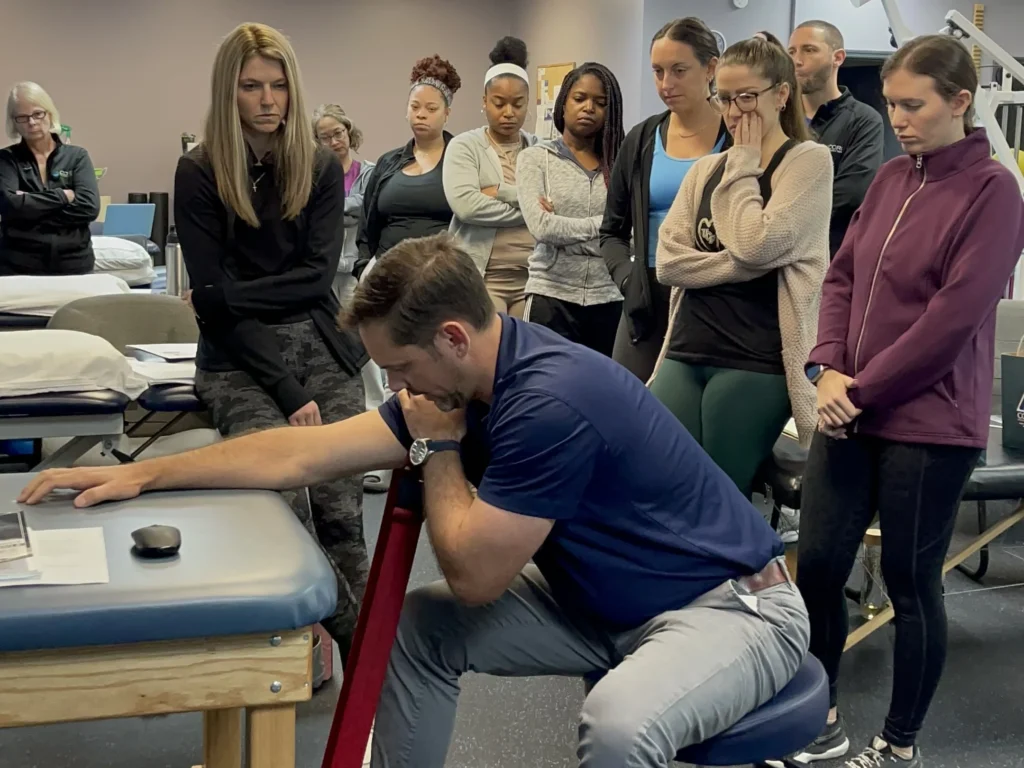
In the clinical setting, where each decision can have a profound impact on patient outcomes, the role of mentors in healthcare is essential.
As clinicians navigate the complexities of patient care, the guidance shared by seasoned professionals is invaluable.
Mentorship, described as the “magic” behind clinical excellence, is a cornerstone in the development of both new and experienced healthcare providers.
This blog delves into the importance of mentors in the clinical setting, exploring how it shapes not only the skills of clinicians but also the overall quality of care provided to patients.
Mentors in Clinical Setting
At its core, mentorship is about more than just imparting knowledge—it’s about fostering a culture of continuous learning and professional growth.
As Stephanie May, an Occupational Therapist and Clinic Manager, points out, “Not one person knows everything. If you have a mentor or a group of people working collaboratively, it only enhances the treatment and care provided to patients.”
This collaborative spirit is essential in a clinical environment where no single clinician can know it all, and the collective expertise of a team often leads to the best outcomes.
Mentorship creates a safe space where less experienced clinicians can grow without fear of making mistakes.
As Stephanie observes, mentorship allows therapists to “become more comfortable” and “not self-conscious” in their practice because they know they have someone to guide them.
This assurance is crucial, particularly in high-stakes environments where the confidence of the clinician directly impacts the patient’s experience.
Why Mentors Matter in the Clinical Setting
The clinical setting is unique in that it requires both technical expertise and interpersonal skills. Mentors play a pivotal role in nurturing these qualities in their mentees.
“Mentorship is where the magic happens.”
Ashley Langford, PT, DPT, OCS, FAAOMPT, Cert. DN, AIB-VR
Director of Clinical Excellence, CORA Institute for Clinical Excellence
Ashley Langford, the Director of Clinical Excellence, aptly notes, “Mentorship is where the magic happens.” Unlike formal education, which often provides a broad understanding of concepts, mentorship offers real-time, practical learning that is tailored to the specific challenges faced by clinicians.
Mentorship is not just about teaching; it’s about empowering. A good mentor recognizes the potential in their mentees and helps them unlock it.
Empowerment is essential in healthcare. Clinicians must be able to think critically, solve problems efficiently, and adapt to the ever-changing needs of their patients.
Without mentorship, many clinicians might struggle to develop these skills on their own, potentially leading to burnout or suboptimal patient care.

The Mentor-Manager Dynamic
One interesting aspect of mentorship in the clinical setting is the intersection between mentorship and management.
While the roles of a mentor and a manager are distinct, they often overlap in practice. As both Stephanie and Ashley have experienced, a good manager often embodies the qualities of a mentor, using their position to foster growth and development in their team.
The difference, however, lies in the approach.
A mentor focuses on skill development and personal growth, often working alongside the clinician to guide them through challenges.
A manager, on the other hand, must balance these developmental goals with the operational needs of the clinic.
Despite these differences, the best managers are those who also excel as mentors, as they create an environment where clinicians feel supported in both their professional development and their day-to-day responsibilities.
Qualities of an Effective Mentor
So, what makes a good mentor?
According to Stephanie and Ashley, several key qualities stand out. First and foremost is a “learning mindset.” A mentor should be knowledgeable and humble enough to acknowledge that there is always more to learn. This mindset ensures that the mentor remains open to new ideas and approaches, which they can then pass on to their mentees.
Another crucial quality is the ability to inspire and motivate.
As Ashley points out, mentorship is about more than just imparting knowledge—it’s about creating an experience that resonates with the mentee.
Mentoring another professional might involve sharing personal stories of success and failure, demonstrating new techniques in real-time, or simply being there to offer encouragement when things get tough.
Finally, an effective mentor must be willing to provide honest, constructive feedback.
While it can be uncomfortable to critique someone’s work, this feedback is essential for growth. The best mentors deliver this feedback in a way that is supportive rather than punitive, helping the mentee to see mistakes as opportunities for learning rather than failures.
The Ripple Effect of Mentorship
The impact of mentorship extends far beyond the individual clinician.
As Stephanie explains, mentorship creates a “ripple effect” across the entire clinical community. When a mentor helps a clinician to improve their skills, the benefits are passed on to every patient that clinician treats.
Over time, this leads to a higher standard of care across the board.
Moreover, mentorship fosters a culture of collaboration and mutual support.
In a field as demanding as healthcare, having a strong support network is invaluable. Clinicians who have benefited from mentorship are more likely to become mentors themselves, perpetuating a cycle of learning and improvement that enhances the entire profession.
“Physical therapists often have a very mechanical mindset…whereas OTs have that holistic mindset.”
Stephanie May
Certified Hand Therapist, Occupational Therapist
Clinic Manager, CORA Physical Therapy
Cross-Disciplinary Mentorship: A New Perspective
One of the more innovative aspects of mentorship in the clinical setting is the concept of cross-disciplinary mentorship.
Traditionally, mentors and mentees come from the same field—PTs mentor PTs, OTs mentor OTs, and so on. However, as Ashley and Stephanie discuss, there is significant value in crossing these boundaries.
For example, a Physical Therapist (PT) might benefit from the holistic perspective of an Occupational Therapist (OT), who may approach patient care with a different mindset.
As Stephanie notes, “Physical therapists often have a very mechanical mindset…whereas OTs have that holistic mindset.” By combining these perspectives, clinicians can develop a more well-rounded approach to patient care, ultimately leading to better outcomes.
Conclusion: The Lifelong Value of Mentorship
In conclusion, mentorship in the clinical setting is not just a nice-to-have; it is a fundamental component of professional development and patient care.
Whether it’s through providing guidance, offering support, or challenging clinicians to think differently, mentors play a crucial role in shaping the future of healthcare.
As Stephanie wisely advises, “Never stop learning.”
This commitment to lifelong learning is at the heart of mentorship, driving both mentors and mentees to continually strive for excellence in their practice. In doing so, they ensure that the next generation of clinicians is even better equipped to meet the challenges of healthcare, ultimately leading to improved patient outcomes and a stronger healthcare system overall.
Mentorship in the clinical setting is indeed a key factor in empowering clinicians and enhancing patient care, one relationship at a time.